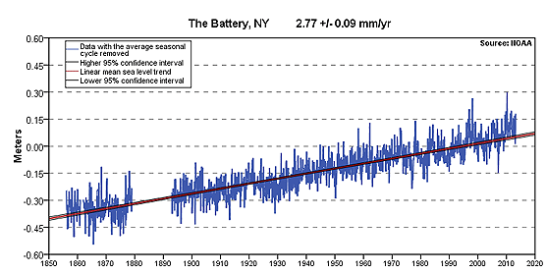 PassedOut, on 2014-December-05, 09:43, said:
PassedOut, on 2014-December-05, 09:43, said:
The problem we face, and it is a complex one, is projecting the future climate using information available now. Doing so requires modeling. You don't evade that requirement by projecting future warming at the rate of warming since the mid-19th century: You simply substitute a much simpler model. There is no reason to suppose that your simpler model will hold in the face of changing conditions, and (I think) plenty of reasons to suppose that it will not.
Mankind has been moving buried carbon to the atmosphere at the rate of billions of tons per year to the point where CO2 levels are the highest in 15 million years. CO2 traps heat. We are disturbing a complex system, and no one knows exactly how that will play out. However, sea levels are bound to rise and the people living in low-lying areas already face serious problems. If the North Atlantic Drift is disrupted, Europe will experience adverse consequences.
Because of the uncertainties involved as well as the impending difficulties that can no longer be stopped, conservatives keep pushing for a market-based approach to reduce emissions. To date the conservatives have been losing politically to the Pollyannas, but that has to change. The sooner it does, the better.
The problem with market-based solutions is that first the market must identify a problem and then see the solution to that problem as potentially profitable. If neither problem or profit potential is seen, the market ignores problems. The market sometimes needs guidance and a push start. Pushing the private sector to perform is a role played quite well by the government and government regulations.
Case in point is the standard for water use in toilets. This was never considered a problem for business until 1994. It is now standard for toilets to flush using 1.6 gallons of water - it used to take 3.5 gallons. Government regulations mandated that after 1994 new toilets must use 1.6 gallons or less per flush - and that regulatory effect caused industry to find new ways to utilize water for waste disposal. More efficient use of water for waste disposal is a classic example of good government intervention and good private sector response. Without this joint effort, no doubt we would still be wasting water.
Just as burying one's head into the sand does not alleviate problems, so does discounting the positive effects government can have provides a dark and sand-like insulation for denial.

 Help
Help







